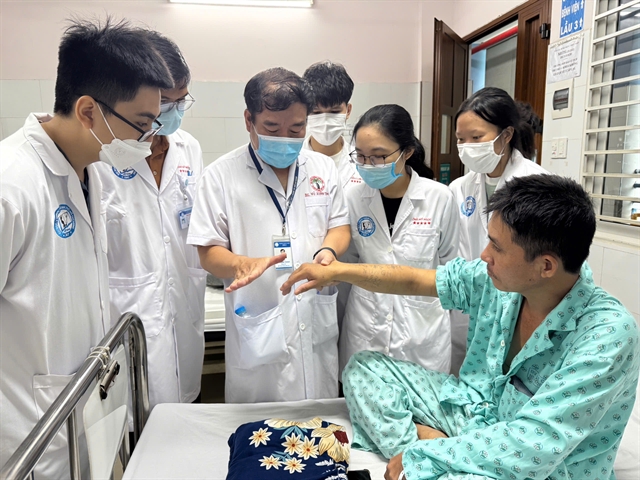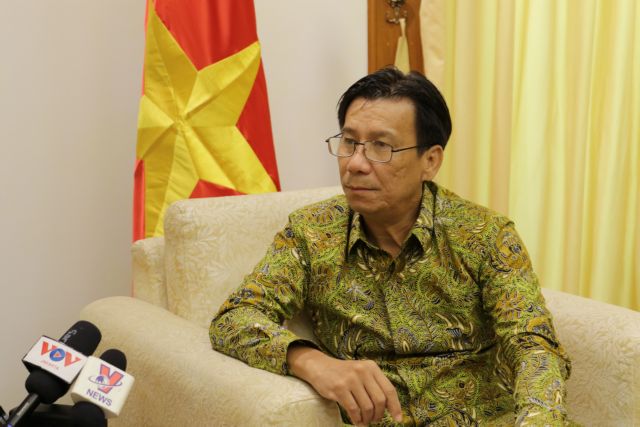 Opinion
Opinion

 |
| Vietnamese Ambassador to Indonesia Tạ Văn Thông. — VNA/VNS Photo |
On the occasion of the 10th anniversary of the establishment of the strategic partnership between Việt Nam and Indonesia (June 27, 2013 – June 27, 2023), Vietnamese Ambassador to Indonesia Tạ Văn Thông talks to Vietnam News Agency (VNA) about the bilateral relationship.
How has the relationship between Việt Nam and Indonesia evolved since the two countries elevated their ties to a strategic partnership in 2013?
During the State visit of the then President Trương Tấn Sang on June 27, 2013, both countries issued a Joint Statement establishing the strategic partnership. Since then, the strategic partnership between Việt Nam and Indonesia has witnessed robust, comprehensive and steadfast growth. An important milestone was marked in 2017 when General Secretary and the then President Nguyễn Phú Trọng made an official visit to Indonesia, becoming the first top leader of the Party to visit the country since President Hồ Chí Minh in 1959.
In 2018, President Joko Widodo paid a State visit to Việt Nam and the then Prime Minister Nguyễn Xuân Phúc also made a working visit to Indonesia. In 2021, despite the challenges posed by the COVID-19 pandemic, Prime Minister Phạm Minh Chính chose Indonesia for his first overseas trip as Prime Minister. In 2022, the then President Nguyễn Xuân Phúc embarked on a State visit to Indonesia.
The signed action programmes have further deepened bilateral cooperation across various sectors, including politics, diplomacy, defence and security, economy, tourism, culture and people-to-people exchanges. The two countries are currently finalising the action plan for the 2024-28 period, which will be signed as soon as possible. Mechanisms such as the Committee for Bilateral Cooperation at the Ministerial Level have held three sessions, and the Joint Committee on Economic, Scientific, and Technical Cooperation has held two sessions.
Significant progress has been made in economic and trade cooperation. Bilateral trade between the two countries has witnessed positive growth, with Indonesia currently being Việt Nam's third largest trading partner in Southeast Asia, and Việt Nam being Indonesia's fourth largest trading partner. In 2013, bilateral trade turnover stood at only US$4.8 billion, but it has nearly tripled since then, reaching $14.1 billion in 2022.
In the first four months of 2023 alone, bilateral trade turnover has reached over $4.2 billion, with exports to Indonesia amounting to $1.6 billion, a 9 per cent increase compared to the same period in 2022. It is expected that in 2023, bilateral trade turnover between Việt Nam and Indonesia could reach or exceed $15 billion, soon realising the target set by the leaders of both countries.
Defence and security relations have also witnessed significant advancements, including notable visits such as the Indonesian Defence Minister's visit to Việt Nam in May 2022, visits to Indonesia by the Chief of the General Staff of the Việt Nam People's Army, and the active participation of the Vietnamese delegation in the ASEAN-Russia multilateral naval exercises held in December 2021. In December 2021, the Việt Nam Coast Guard and the Indonesian Maritime Security Protection Agency signed a cooperation agreement, contributing to the enhancement of security in the common maritime border area between the two countries.
Cooperation in other fields has also been strengthened. In the agro-fishery sector, both countries are actively promoting collaboration in aquaculture, fishing, and seafood processing, with a particular emphasis on maritime and fishery activities. Recently, the Indonesian Minister of Marine and Fisheries paid a working visit to Việt Nam, further fostering cooperation in this domain.
Cultural cooperation, education and training, tourism, and people-to-people exchanges continue to flourish. The two nations have collaborated in commemorating the 60th anniversary of the visits made by President Hồ Chí Minh and President Sukarno, contributing to a closer bond between the Vietnamese and Indonesian peoples. Several localities in both countries have established partnerships.
Additionally, efforts are being made to promote cooperation agreements between HCM City and Bali province, as well as between Huế City and Denpasar city. Indonesia continues to offer numerous training and cultural scholarships to Vietnamese students. The number of tourists visiting each country is on the rise, with approximately 70,000-80,000 tourists from each country choosing to travel to the other. Direct flights between HCM City and Jakarta and Bali, as well as between Hà Nội and Bali, have been resumed with high frequency, and further routes are being considered, including those connecting Đà Nẵng and Yogyakarta.
Việt Nam and Indonesia have witnessed significant cooperation in various fields, driven by their long-standing tradition of friendly relations. The foundation laid by leaders such as President Hồ Chí Minh and President Sukarno, as well as the efforts of subsequent generations, has been instrumental in fostering this relationship over the past 68 years.
It is worth noting that Indonesia was the first country in Southeast Asia with which Việt Nam established official diplomatic relations in 1955. In 1990, Indonesian President Suharto became the first head of state from Southeast Asia and the South Pacific to visit Việt Nam after 1975. The partnership between the two countries experienced rapid growth following Việt Nam's accession to ASEAN and the establishment of a Comprehensive Partnership in 2003. Việt Nam remains the only strategic partner of Indonesia in Southeast Asia, a testament to the significance of their relationship since the elevation of ties in 2013.
The strong political ties and deep-rooted friendship between Việt Nam and Indonesia are highly valued by senior leaders and the people of both countries, and they are committed to preserving and promoting these valuable assets.
Economic cooperation, which has been a focal point of bilateral relations, has made remarkable progress. Indonesia is currently one of Việt Nam's key partners in the region. As I mentioned earlier, the two-way trade has surpassed expectations, with significant potential for further growth.
In the future, Việt Nam and Indonesia will continue to strengthen their long-standing friendship, serving as a driving force for taking the Việt Nam-Indonesia Strategic Partnership to new heights. The signing of the action plan for the new period of 2024-28 will further deepen the comprehensive cooperation between the two countries and open up opportunities for collaboration in emerging fields, such as energy transformation, digital transformation, infrastructure development, and economic growth. These initiatives have been agreed upon by the senior leaders of both nations.
Economically, Việt Nam and Indonesia are two rapidly emerging economies with significant potential. Indonesia, being the 16th largest economy in the world, offers a growing middle class market with ample room for Vietnamese products and goods.
Similarly, Việt Nam presents opportunities for Indonesia to foster trade and investment cooperation. Both countries should leverage these new prospects, enhance cooperation, and transform challenges into opportunities by fostering innovation and development. It is crucial to improve the legal framework for cooperation, enhance the efficiency of the Joint Committee on Economic, Scientific, and Technical Cooperation, reduce trade barriers, facilitate trade and investment flows, and provide active support to the business communities of both nations in implementing cooperative activities and participating in trade promotion events within each country. Additionally, Việt Nam and Indonesia should explore opportunities for collaboration in new fields, capitalising on the potential brought by the Fourth Industrial Revolution.
Could you please outline the main priorities and directions to promote Việt Nam-Indonesia relations in the near future?
In terms of politics and security, it is important to strengthen unity and coordination between the two countries in multilateral organisations and forums. This will contribute to consolidating solidarity and ASEAN's central role while maintaining peace, stability, cooperation, and development in the region and globally. It is vital to continue promoting exchanges and contact at all levels, maintain and enhance the effectiveness of existing cooperation mechanisms, and coordinate policies aligned with Indonesia's regional priorities, particularly during Indonesia's term as ASEAN Chair in 2023. Additionally, Việt Nam and Indonesia should strive to deepen cooperation in the defence and security sector through increased delegation exchanges.
Regarding the economy and trade, the focus should be on promoting economic, trade, and investment cooperation. Joint efforts should be made to propose solutions that increase bilateral trade and aim for higher trade targets.
Emphasis should be placed on balanced trade development and leveraging the potential for collaboration in new fields, particularly in relation to the "energy transition" plan. It is crucial to engage in negotiations to remove non-trade barriers, address difficulties, and create favourable conditions and incentives for businesses from both sides to access each other's markets effectively.
In terms of culture, education, tourism, and people-to-people exchanges, it is essential to strengthen connections and foster people-to-people exchanges through the exchange of art troupes and engagement with mass and local associations. Both countries should increase the allocation of scholarships for students from both sides to study and gain practical experience in each other's countries.
In the near future, Indonesia may become one of the preferred destinations for Vietnamese students in Southeast Asia. Việt Nam and Indonesia should further tap into the potential of tourism in the region, collaborating to complement each other's offerings through the development, promotion, and growth of tourism-related products.
In order to enhance mutual understanding of each other's history, traditions and culture, it is essential to promote cultural exchanges and facilitate tourism between the two countries. Both sides should consider increasing the frequency of flights and exploring the possibility of opening new routes connecting tourist destinations. Tourism-related projects should also take into account Indonesia's capital relocation and its efforts to expand into new areas.
As active members of ASEAN, what does close cooperation between Indonesia and Việt Nam mean in promoting peace and prosperity in the region?
The cooperation between Việt Nam and Indonesia holds great significance for the establishment of the ASEAN Community and the role and position of ASEAN within the current regional landscape. Indonesia has been a leading supporter of Việt Nam's accession to ASEAN, and through the active participation and contributions of Việt Nam and other member countries, ASEAN has become one of the most successful regional organisations in the world.
The region of Southeast Asia has enjoyed long-standing peace and stability, creating favourable conditions for the development and prosperity of its member countries. The expanding partnerships within ASEAN, including mechanisms like the ASEAN Summit, AMM/PMC, East Asia Summit, and strategic partnerships with global and regional powers in Asia-Pacific, have contributed to addressing complex issues such as the South China Sea dispute, gradually moving towards an effective and efficient Code of Conduct in the South China Sea, which will bring peace, stability, and security to the region.
Both Indonesia and Việt Nam are active members of ASEAN, working together to promote the development of the ASEAN Economic Community. Indonesia, with its population of over 280 million, represents the largest market within ASEAN, while Việt Nam, with its impressive economic growth and a population of 100 million, is the third-largest market. During the early stages of the COVID-19 pandemic, Việt Nam, as the ASEAN Chair, coordinated with member countries, including Indonesia, to respond flexibly to the evolving situation. Efforts were made to restore supply chains, ensure a conducive environment for production and business, and enhance the self-resilience and internal strength of ASEAN. — VNS